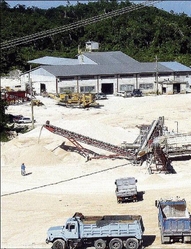Lydford mining firm expands amid sector downturn
Published: Wednesday | November 4, 2009


Left: Operations at Lydford Mining in St Ann. Right: The Lydford mine in St Ann. - Contributed photos
Despite devastating declines in the mining and quarrying subsector of the national economy, which registered a whopping 62.5 per cent fall-off in the June quarter this year as reported by the Planning Institute of Jamaica (PIOJ), small family-run mining operation in St Ann is not only holding its own, but looking to expand next year.
Exploiting what is considered a non-traditional area in mining, Lydford Mining Company (LMC), run by Edgar Cousins, has grown from its wheelbarrow and shovel days with four workers to become today a formidable 50-staff business turning over US$2 million a year. As the effects of the global recession reverberate in the economy, the company, Jamaica's sole exporter of calcium carbonate, commonly known as whiting - a mineral deposit found in abundance in the Lydford area of St Ann - saw revenues dipping to US$1.5 million in 2008 to 2009.
However, taking the bull by the horn, Cousins, the managing director of the 16-year-old company, is going on the offensive with further product diversification and business-expansion plans geared at ramping up production and sales in Jamaica and overseas.
Lydford Mining has partnered with listed local conglomerate, Jamaica Producers Group, in a new venture to mine and produce river sand and gravel from the eastern St Thomas area, aimed at adding a further US$4 million to the company's bottom line next year.
Details of the deal
Details of the structure of the deal have not been disclosed.
Moving ahead to consolidate its diversification away from only producing the mineral by-product, used in wide range of applications from medicinal to pottery and an array of industrial and manu-facturing applications, LMC has already put in place a state-of-the-art crushing and screening facility to handle the aggregate meant to fill a supply gap in the local, regional and Southeast US markets.
Recently, LMC partnered with the New York-based TBS Mining/Shipping
LMC's Cousins said the first of these supply contracts has already been signed for the production and delivery of up to 400,000 metric tones per year, over 10 years, to a new power plant in the American Southeast.
The latest move is a continuation of strategic shift that began in 2002, when the company poured US$2 million into building a pilot plant to further process its main product, whiting, from its raw form into a range of finished products. This step, according to LMC's principals, added significant value to the product and opened up new markets in Jamaica and overseas.
Refined product
The refined product is now sold in Jamaica, Trinidad and Barbados to producers of paint, wall and floor finishes, PVC pipes, fertilisers, laundry soaps, kitchen cleansers and animal feeds. High-purity limestone is also used in high-grade plastic suitable for the automobile industry where it is used to make bumpers, hubcaps, dashboards, etc.
Its use also extend to paper coatings, paint fillers, food, pharmaceuticals, and cosmetics.
The mineral-extracting and processing business saw further expansion in 2006, facilitated by increased local demand in the construction industry for the crushing
An important innovation in the business was the design and establishment of mobile equipment, Cousins told Wednesday Business in an interview.
"This innovation has resulted in a whole new niche market being developed for processing ofmaterials for other producers and
However, the growing company is not yet at its optimum operating level and its head said the firm is awaiting the green light from the Government for a US$15 million investment it has on the drawing board for its Lydford mines as well as the Reynolds pier in Ocho Rios, from where it exports its products under a long term lease.
Cousins is contending that the approval delay is resulting in significant loss of business amounting to millions of US dollars.
"High-purity deposits at Lydford are one of the purest known calcium carbonate deposits in the world. Enormous potential resides there for the further development of whiting-grade material and construction and metallurgical limestones."
Regional producers
According to figures supplied by LMC, other regional producers are outstripping Jamaica's production and export levels by far.
"The disparity is obvious, the question is why is this so? A large segment of Jamaica's future of foreign exchange income will be derived from the export of minerals," Cousins said.
The company, that is the sole Jamaican exporter of whiting, was founded by Leo Cousins, an engineer, and Dr Vincent Hill, chemist and geologist.
"The company started very small and with very little capital," Edgar Cousins recalled.
"The risk was considerable, as all the exploration
avia.collinder@gleanerjm.com

















